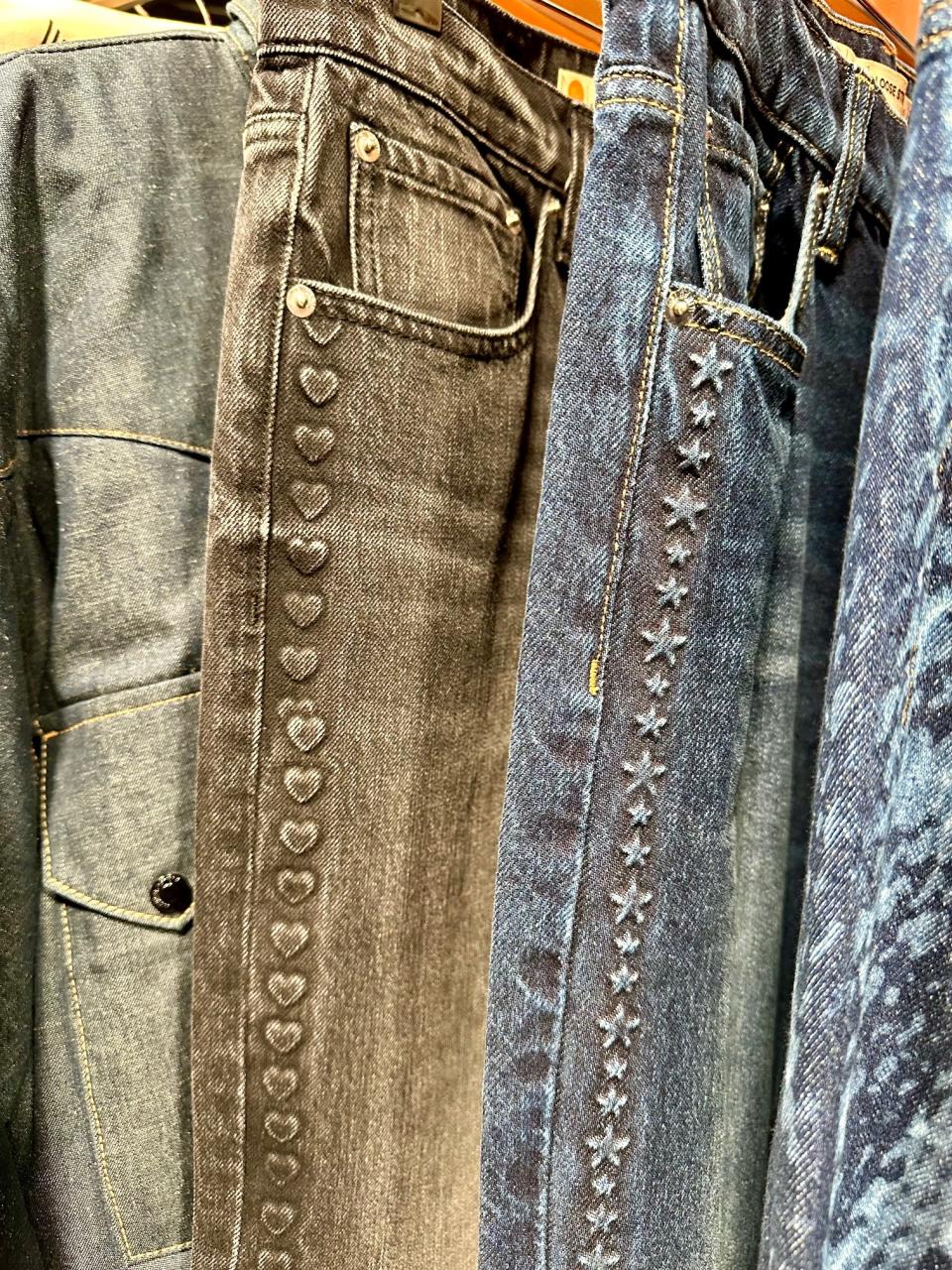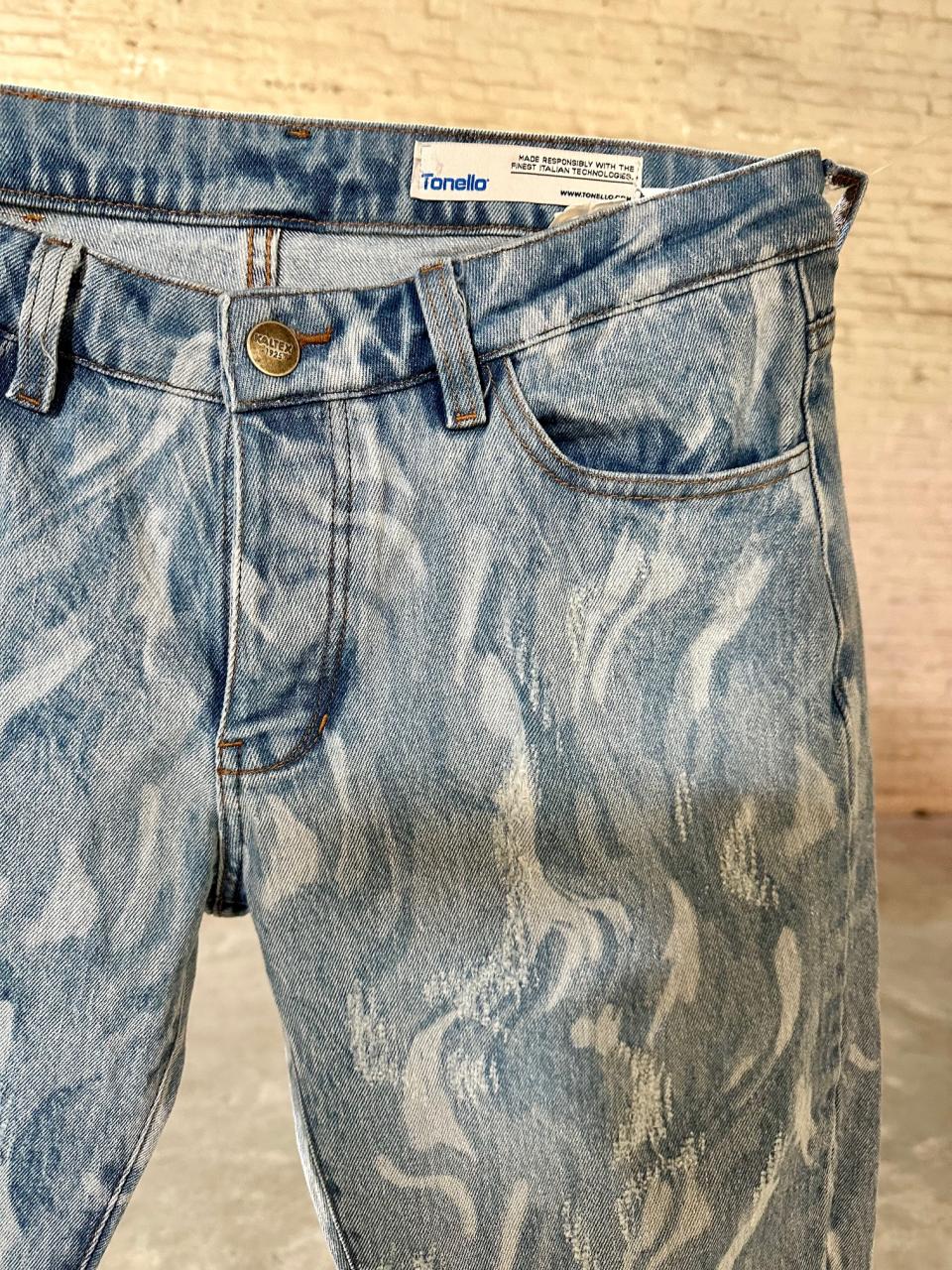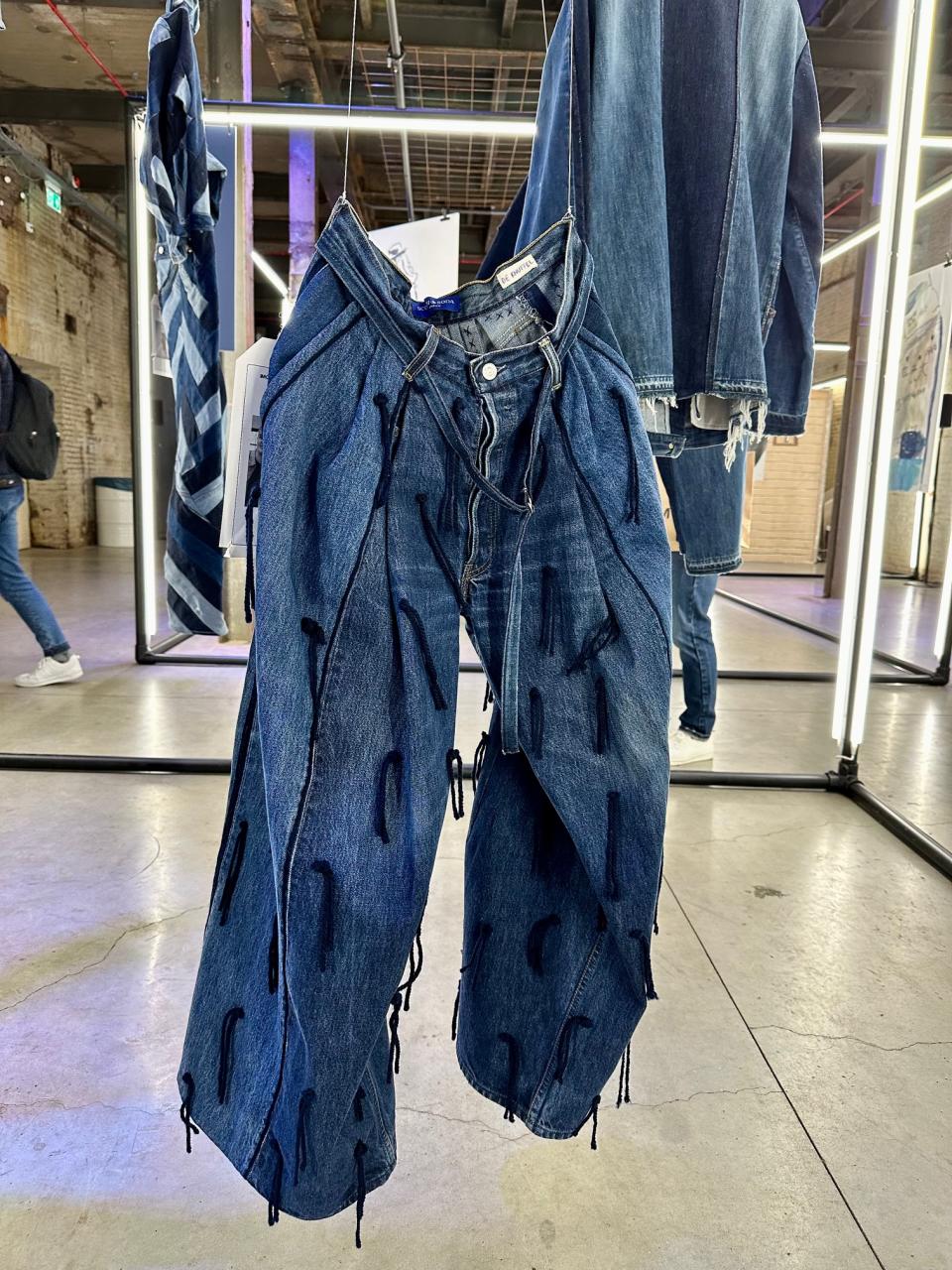Kingpins Amsterdam Recap: Workwear, Color and Collaborations

Workwear and color are two areas mills are focusing on to inject newness into denim.
At Kingpins Amsterdam last week, mills presented Fall/Winter 2025-2026 fabric concepts that push workwear further into everyday fashion and colors beyond denim’s traditional indigo hues.
More from Sourcing Journal
One of Advance Denim’s most popular items was a coated canvas fabric with a brushed back. The mill also showed indigo canvas for a “real vintage look,” natural selvedge fabrics made with cotton and hemp and rigid fabrics with open constructions and character.
Mexico-based Kaltex showed a range of non-denim canvas garments made with Lycra ToughMax technology as well as garment-dyed pieces in shades in earthy shades of brown and tan.
Marble effects continue to be popular for AGI Denim, though the Pakistani mill is seeing some interest in flat and refined fabrics for elongated silhouettes. The mill also presented fabrics with recycled Smart Linen, neppy and cottonized hemp and Regen bio-based spandex from Hyosung.
In a nod to Western and rodeo fashion, Cone Denim presented Marque, a broken twill with a built-in sheen. The fabric is comprised of cotton, Tencel and recycled cotton. Cone expanded its 100 percent recycled fabric range to include black and natural, which Sarah Posluszny, Cone’s product design manager, said is a major accomplishment given the contaminants that are usually in recycled cotton.
Artistic Milliners partnered with Japanese denim legend Maasaki Sakaguchi on Shogun, a collection of everyday garments spanning an overdyed herringbone weave jacket to selvedge jeans. The collection was a contrast to the mill’s 90210 Reloaded range of crosshatch and tinted Y2K-inspired fabrics and Glitz, a range of dobby weaves, leather coatings and random fading.
Aligning with the near nostalgia trend Denim Dudes forecast for Fall/Winter 2025-2026, Cone also showed Radio Star, a popular fabric from the late ’90s and early 2000s. The mill updated the construction with a new shade and Tencel.
Arvind highlighted the capabilities of its denim mill and piece dye mill with a Fall/Winter 2025-2026 collection of elevated workwear. A crossover between traditional denim and workwear, the collection spanned refined denim with rich indigo shades, bi-stretch Tencel blends, 2×1 broken twills and linen and cotton blends in all-season constructions.
Though Meghan Langston, Arvind’s head of U.S. sales and marketing, said the mill is in the middle of a “blue revolution,” the mill addressed the strong return of black denim with Neo-Goth, a black denim that can fade down to almost white, and color denim achieved with overdyes and spray dyeing. The sulfur dyes wash down like traditional indigo.

Arvind also showed digitally printed denim and a fresh range of color corduroy including a soft plum indicative of the market’s shift from bold Y2K colors to shades pulled from nature.
AGI Denim, which recently collaborated with sustainability analytics platform Green Story to measure the environmental impact of its products, presented several new black fabrics. The new products span a black with a green cast, a black-black with a black weft and a vintage black with high chip-off ability. For fashion looks, AGI offered Gemset coating, a pearlescent coating that can be garment dyed to create true metallics.
The mill’s new creative services studio, The Agency, offered even more trend-oriented options like pretty peach and lavender tints, clear coatings, silicone embossing, quilting and laser techniques that mimic the look of jacquard fabrics.

Cone Denim bowed a new green selvedge fabric dyed with Colourizd technology, a process that injects color at the fiber level. The fabric is part of the mill’s Community Collection designed to bring awareness and support the Rainforest Alliance, a non-profit organization that amplifies the voices of farmers and forest communities and protects biodiversity.
Posluszny said the mill is also seeing interest in smokey hues, muddy indigo shades and green casted indigos.
Kaltex experimented with yellow and green cast indigos to create a fresh take on vintage. “Commercial tints,” toned-down colors and blue blacks were also areas of focus for Nishat Mills.
The Pakistani mill also showed a wide range of overdyed denim and lightweight denim pigmented with natural dyes. For more trend-oriented clients, Nishat presented herringbone constructions with metallic coatings, block prints and denim with tonal embroideries.
Fiber Focus
Hyosung, the Seoul, Korea-based spandex producer, showcased fabrics made with its Regen bio-based spandex offering to include options for the yarn to be made with 30 percent, 70 percent and 98 percent renewable resources. An independent third-party LCA found that the manufacture of 1kg Regen Bio-Based spandex reduces its carbon footprint by 20 percent as compared to the production 1kg of conventional spandex.
The company also drummed up interest in its new vertically integrated bio-based fiber manufacturing plant in Vietnam. Hyosung is partnering with Geno to produce Bio-BDO, which is manufactured by fermenting sugars derived from sugarcane, replacing traditional fossil raw materials such as coal.
The location of the facility, which will have a capacity of 200,000 tonnes by the second half of 2026, allows greater control over the spandex’s supply train and shorter transportation times as many of Hyosung’s mill partners are in Asia.
The Lycra Company launched FitSense, a yarn and garment processing solution years in the making that allows brands to customize jeans with targeted compression shaping in certain areas without sacrificing comfort or changing the authentic look and feel of denim.
The patented technology is a dual-core structure that wraps Lycra fiber with temperature-responsive fiber. Garment manufacturers then use a heat press to activate or lock in shaping power in the desired areas. The technology is discreet and invisible on the fabric and garment.
Lycra presented a range of garments made with 9-13oz. fabrics with 30-80 percent stretch from partners Eroğlu, Calik Denim, Soorty, Advance Denim and Crystal Denim. Mark Ix, Advance Denim’s director of North American marketing, said the technology is already generating a lot of interest from customers.
The interest highlights the difference in how clients perceive innovations in performance versus innovations that solely increase sustainability.
The challenges companies are up against to scale new sustainable products weighed on the minds of exhibitors. Alberto De Conti, managing director of Rudolf Hub 1922, likened it to an “overproduction of innovation” that companies are trying to break through.
On the topic of Renewcell’s quest to find a new owner after filing bankruptcy in February and Spinnova’s decline in revenue and restructuring efforts, Lenzing CEO Stephan Sielaff said the broader picture is “a very sad story” because there is a need in the market for circularity.
In 2022, Lenzing entered into a five-year agreement with Renewcell to purchase 80,000 to 100,000 tonnes of its Circulose dissolving pulp to use to produce cellulosic fibers.
Sielaff has hope for circularity’s future but not without changes. The industry and regulators must think about how to create an infrastructure and subsidies to make it possible, he added, otherwise it will be very difficult.
“As an industry, textile recycling is so much more challenging than glass or paper… maybe it was a little bit underestimated. And then the second thing is the cost. We are talking about [costs so high] that the consumers would not be willing to pay.”
Lenzing Group is not without its own set of challenges. Sielaff said the company is “facing a critical time” but is “taking its own avenue in our own hands.” In March, the company reported an after-tax loss of 593 million euros ($645.9 million) in 2023, a more than thousand-fold decrease from the 37.2 million euros ($40.5 million) it ceded in 2022.
“We are not waiting for the market recovery. We earn our own success, and we were doing this by three elements. We master the crisis through cost excellence. We strengthen the core with our top line sales and marketing initiatives. And we stay ahead by really continuing to drive our innovation agenda,” he said.
It’s a holistic program, Sielaff added, that allows Lenzing to maintain its sustainable identity.
“We see quite some movements and requests for our traceable sustainability stories and brands and consumers really embrace and love our brands Tencel and EcoVero because it gives them the good feeling of buying a sustainable product,” he said.
At Kingpins, Lenzing promoted Tencel lyocell as a perfect blending partner for regenerative cotton—a type of cotton that Tuncay Kılıçkan, Lenzing’s head of global business development, denim, said is becoming increasingly important in the denim industry.
The new Tencel x RegenCotton collection features durable and soft fabrics for from 18 global mill partners for on-trend products like ribcage jeans, baggy workwear, jackets and denim chinos.
Collaborations
The show was home to several concept collections aimed to inspire creativity and promote collaborations.
Tonello was a partner in the Most Sustainable Products (MSP) Collection developed with Denim House and Kingpins and designed by Piero Turk and Serena Conti. The range of experimental garments pair Tonello’s sustainable finishing technologies and YKK trims with fabrics from ADM, AGI Denim, Azgard 9, Cone Denim, Crescent Bahuman, Diamond Denim by Sapphire, Kassim Denim, Master Textile, Naveena Denim Mills, Sharabati, Soorty and US Group.
Highlighted fabrics included Diamond Denim’s Illinois GEC 24 Sweet made with 98 percent Good Earth Cotton, Master Textile’s blend of organic cotton, recycled cotton and banana fiber and Cone’s Bonzai fabric comprised of 100 percent certified recycled cotton.
Tonello and Turk regrouped for One Denim, a collection of jeans that showcase the various effects, patterns and textures a single fabric by Kaltex can achieve.

Hyosung’s Creora Future Fit Forum tasked five designers from various backgrounds to explore what denim fits may look like in the future. Each designer was given two pairs of Levi’s 501 jeans to upcycle, and two yards of US Denim denim fabric made with Creora bio-based spandex.
The resulting garments varied from Lucia Rosin’s three-piece Japanese-inspired work jacket, apron and jeans to the “Knuffel” jean (Dutch for “hug”) by Imogen Nulty-Verstraeten, global director of Scotch & Soda’s denim division. Described as a “big hug from Scotch & Soda,” the Knuffel boasted a loose pleated shape, chino pockets and handwritten messages on the inside.

Zero-waste designer Danielle Elsener—who designed the Kingpins staff jumpsuits with Soorty—also participated in the project, using the provided 501s and Creora fabric to make a patchwork fabric. All that remained was a small jar of scraps.
For the third year, The Lycra Company teamed with House of Denim and Jean School students for Stretch Yourself, a project that explores stretch denim through a next-gen lens. Working with fabrics that use Lycra Adaptive fiber or Lycra Dual Comfort, the students made innovative silhouettes such as reversible garments and ruched jeans. The students finished the garments with a mix of manual and automated techniques including laser, ozone, patchwork, crochet and coffee and tea stains.
AGI Denim’s The Agency partnered with adaptive stylist Stephanie Thomas to develop a range of trendy adaptive denim garments. Made with soft fabrics, the line spans jeans, skirts, shorts and jackets featuring Velcro and magnetic closures, flat seams and no side seams.
Cone Denim is leaning into workwear roots with another collaboration with Amsterdam-based AMK Atelier.
The City Farmers Project is a year-long initiative that will have AMK Atelier founder Maria Gunnarsson design and produce contemporary workwear made from Cone fabric for six young farmers (five women and one man). The farmers, who work on a biological farm on the west edge of Amsterdam that produces vegetable boxes for locals, will wear the garments for one year. Cone and AMK Atelier will present the garments at Kingpins Amsterdam next April to show how they held up in the elements.
Gunnarsson said the collection is an opportunity to design for a variety of shapes and sizes and enhance the functionality of workwear. Overalls are outfitted with built-in knee pads; vests feature multiple types of pockets and nylon bags designed for collecting and releasing produce. She added that combining Cone Denim’s organic cotton fabrics and natural dyes with the analog photography used to capture the farmers wearing and working in the garments brings her vision of slow fashion to life.

